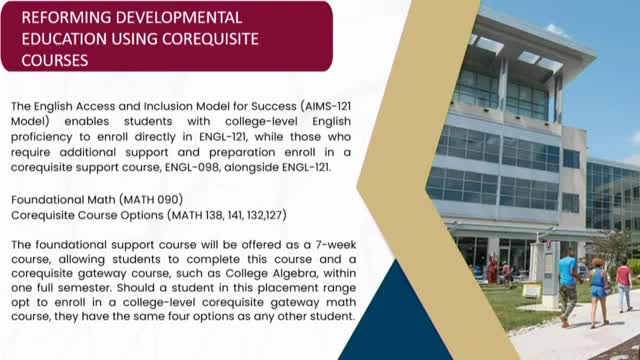Howard Community College introduces English Access and Inclusion Model for student success
September 26, 2023 | Maryland Department of Education, School Boards, Maryland
This article was created by AI summarizing key points discussed. AI makes mistakes, so for full details and context, please refer to the video of the full meeting. Please report any errors so we can fix them. Report an error »

The Maryland State Board of Education convened on September 26, 2023, to discuss significant advancements in educational support systems, particularly focusing on the English Access and Inclusion Model for Success. This initiative aims to assist students who do not qualify for direct entry into English 121 courses by providing a co-requisite support model.
During the meeting, a representative from Howard Community College (HCC) highlighted the importance of this model, emphasizing that it would allow students to receive credit while taking support courses. The speaker noted that many students currently enrolled in developmental courses do not earn credits, yet they pay the same tuition as those in credit-bearing classes. This situation often leads to high dropout rates, particularly among underrepresented demographics.
The board discussed the need for a standardized placement system across the state to ensure fair assessment of student readiness. The speaker shared personal experiences, illustrating how proper placement can significantly impact a student's educational journey and future opportunities.
In addition to the English model, the board explored the implementation of accelerated course formats, transitioning from traditional 15-week semesters to 7-week terms. This change aims to address the critical dropout period around weeks 7 to 9, providing students with a more manageable timeline to complete their courses.
Board members expressed gratitude for the initiatives presented, acknowledging the potential for increased access to education for all students. However, they also recognized that while these changes may improve opportunities, persistent gaps remain, particularly for Black and brown students. The board emphasized the importance of ongoing efforts to close these gaps and ensure equitable access to higher education.
The meeting concluded with discussions on future initiatives, including Project Elevate, which aims to support students at risk of entering the justice system, and the impact of dual enrollment programs on student demographics. The board remains committed to refining educational strategies to enhance student success across Maryland.
During the meeting, a representative from Howard Community College (HCC) highlighted the importance of this model, emphasizing that it would allow students to receive credit while taking support courses. The speaker noted that many students currently enrolled in developmental courses do not earn credits, yet they pay the same tuition as those in credit-bearing classes. This situation often leads to high dropout rates, particularly among underrepresented demographics.
The board discussed the need for a standardized placement system across the state to ensure fair assessment of student readiness. The speaker shared personal experiences, illustrating how proper placement can significantly impact a student's educational journey and future opportunities.
In addition to the English model, the board explored the implementation of accelerated course formats, transitioning from traditional 15-week semesters to 7-week terms. This change aims to address the critical dropout period around weeks 7 to 9, providing students with a more manageable timeline to complete their courses.
Board members expressed gratitude for the initiatives presented, acknowledging the potential for increased access to education for all students. However, they also recognized that while these changes may improve opportunities, persistent gaps remain, particularly for Black and brown students. The board emphasized the importance of ongoing efforts to close these gaps and ensure equitable access to higher education.
The meeting concluded with discussions on future initiatives, including Project Elevate, which aims to support students at risk of entering the justice system, and the impact of dual enrollment programs on student demographics. The board remains committed to refining educational strategies to enhance student success across Maryland.
Don't Miss a Word: See the Full Meeting!
Go beyond summaries. Unlock every video, transcript, and key insight with a Founder Membership.
✓
Get instant access to full meeting videos
✓
Search and clip any phrase from complete transcripts
✓
Receive AI-powered summaries & custom alerts
✓
Enjoy lifetime, unrestricted access to government data
30-day money-back guarantee

